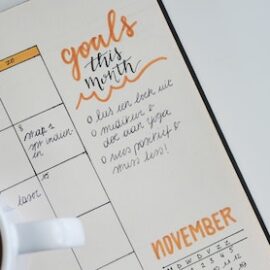

This article is an excerpt from the Shortform book guide to "Everybody Writes" by Ann Handley. Shortform has the world's best summaries and analyses of books you should be reading.
Like this article? Sign up for a free trial here.
Do you want to establish a daily writing routine but don’t know how to start? How strict should you be? Does it matter what time of day you write?
Are you naturally a bad writer? Trick question: There’s no such thing. In Everybody Writes, bestselling author, speaker, and digital marketer Ann Handley explains that writing is a practice—not a talent—and that anyone can improve their writing through consistent work and practice.
Keep reading to learn how a daily writing routine will make you a better writer.
Daily Writing Routine
You don’t need to be a Hemingway or a Faulkner to produce great content: You just need a routine, a process, and a voice—plus something to write with!
Handley first recommends that you establish a daily writing routine. Most of us already write on a regular basis, whether it’s emailing for work, posting on social media, or journaling. However, we may not be writing to the best of our abilities when we do these things, and better writing produces better results. The key to improving your writing is to do more of it.
(Shortform note: Handley doesn’t give a recommendation for how much time each day you should spend on writing, but a good rule of thumb is to write for about an hour each day—though you may want to start out with 15-30 minute sessions at first and then work your way up to longer sessions.)
Handley recommends a strict daily writing routine and says that missing days lessens your motivation to write. She recommends practicing writing in whatever form works best for you, whether it’s a journal where you jot down a few sentences about your day, using writing prompts, or doing stream-of-consciousness writing (writing down thoughts and feelings as they come to you).
(Shortform note: If you struggle to write every single day, you may benefit from collaborative settings designed to help you get into or stay in the habit. In On Writing, Stephen King suggests that things like writer’s workshops and classes can connect you with other talented writers and provide you with a structure to keep your practice consistent.)
Handley also advises that you identify what time of day your writing is the strongest and write at that time every day. If you’re a morning person, you may want to begin each day with writing, but, if you find that your voice is strongest in the evening or even late at night, write then. She also suggests slowing your writing down by using pen and paper instead of typing on a computer so you can process what you’re writing more deeply.
(Shortform note: Some experts disagree that writing by hand is better for your practice than writing on a computer. As Handley says, you should tailor your writing practice to your own needs. Making writing a habit is easier if it’s fun and engaging. If you dread sitting down with a pen and paper, you’re much more likely to procrastinate or make excuses for not writing each day.)
Once you’ve made writing in your preferred format a daily habit, you’ll be better practiced for the writing you have to do for other purposes.
Exercise: Create Your Unique Writing Routine
Handley’s tips are intended to be adapted to your unique writing needs and preferences. Use her advice to create your own writing routine.
- First, consider your writing needs. What type of writing do you do the most? What aspects of that writing do you feel you need to improve?
- Next, consider how you can write more effectively: What motivates you to write? When do you find it easiest to write? How long can you spend writing before you lose your motivation?
- Now, set a daily routine based on your findings above. Note below what time of day you’re going to write and what method you’ll be able to do consistently—for example, journaling, writing prompts, or stream-of-consciousness writing. Each day, make it a habit to write for at least ten minutes, and try not to miss a day. Soon, you should see your writing improve dramatically.

———End of Preview———
Like what you just read? Read the rest of the world's best book summary and analysis of Ann Handley's "Everybody Writes" at Shortform.
Here's what you'll find in our full Everybody Writes summary:
- Why there is no such thing as a bad writer
- A guide to improving your writing and reaching your audience
- How to adapt your writing to different formats while maintaining your voice






